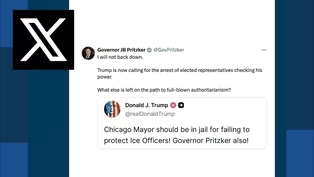Chicago Tonight: Black Voices
Robin Givhan Chronicles Fashion Icon Virgil Abloh's Life in New Book
Clip: 10/8/2025 | 8m 50sVideo has Closed Captions
Illinois native Virgil Abloh shifted the meaning of luxury and who gets to participate in it.
With no formal training, Virgil Abloh became the first African American artistic director of a French luxury fashion house and founder of the Italian brand Off-White.
Problems playing video? | Closed Captioning Feedback
Problems playing video? | Closed Captioning Feedback
Chicago Tonight: Black Voices is a local public television program presented by WTTW
Chicago Tonight: Black Voices
Robin Givhan Chronicles Fashion Icon Virgil Abloh's Life in New Book
Clip: 10/8/2025 | 8m 50sVideo has Closed Captions
With no formal training, Virgil Abloh became the first African American artistic director of a French luxury fashion house and founder of the Italian brand Off-White.
Problems playing video? | Closed Captioning Feedback
How to Watch Chicago Tonight: Black Voices
Chicago Tonight: Black Voices is available to stream on pbs.org and the free PBS App, available on iPhone, Apple TV, Android TV, Android smartphones, Amazon Fire TV, Amazon Fire Tablet, Roku, Samsung Smart TV, and Vizio.
Providing Support for PBS.org
Learn Moreabout PBS online sponsorshipChicagoland native Virgil Abloh shifted what luxury means and who gets to participate in it.
The street where loving son of Ghanaian immigrants from Rockford went on to become the first African-American artistic director of a French luxury fashion house doing so without formal training.
But as the book make it, ours crashing the gates of culture with Virgil Abloh author Robin Van shows us Abloh was so much more than a fashion maker.
Joining us now is the book's author Robin van, a fashion icon to me anyway, in her own right.
And former senior critic at large at The Washington Post.
Thanks for joining us.
It's good to have you here.
Thank you very much for having It was a fashion maker instead of designer.
He didn't really refer to himself that way.
Did he?
Yeah, I mean That's a that's a nap lower.
That's a virtual word.
He like to consider himself a creator, a maker.
>> he didn't really use the word designer in part because he really revere designers.
He had a great deal of respect for them.
>> And he was hesitant to sort of put himself into that category.
You've covered fashion for some time.
Obviously, you're not other a long You've written other books.
Why Virgil Abloh, why did write this book?
>> Well, he was historic because of his rise at home.
>> because as I've been writing about him over the years, both covering his men's wear under his own collection and also his women's.
I was critical of it, you know, because this was not someone who was formally trained and so looking at it, I think through traditional lens of fashion, sometimes the work didn't have the clothes didn't fit as well as perhaps they should have.
He was deeply influenced by a lot of other designers and ideas.
And so sometimes you saw echoes of other people's work.
But at the same time he had a fan base like no other.
And it was sort of tension if you're that was intriguing to me and something I wanted to explore.
So as you mentioned, you were initially harsh harsher critic of him.
>> Are tougher critic before you have before you begin to focus more on his, like you said, his expansive cultural impact rather than distinctiveness.
Sometimes lack of distinctiveness.
He had the 3% rule that will come back to if there's time in his designs.
And in the book you write, quote, Abloh began with a T-shirt, but he wasn't attempting to perfect protect particular silhouette word, rape.
It was not a performance T-shirt.
He was creating an identity, a name.
It's a T-shirt.
Could be an expression of tribalism for music lovers.
In sports fans.
Then it could be that for fashion as well.
And a T-shirt, a big unisex garment that required no tailoring and was easy inexpensive to mass produce was the perfect slate on which to write the beginnings of his fashion story.
What was it about a T-shirt that he was able to pull and get onto people?
Yeah, I mean, and fashion had been changing over the years and some of the biggest changes happened in men's wear.
>> When we think about bad biggest trends really of the last few years, things like the blurring of gender athleisure sneaker culture.
All of that comes from the men's wear side and that is where sort of the power of T-shirts came from as well.
And it was this idea that you could connect with like-minded people.
You could sort of form a community, a team, if you will, and some virtual use a T-shirt, too.
Introduces brand and his brand was off White.
Instead a bat brand being based on a particular garment.
The way that, you know, Gucci is based on, you know, Gucci loafers would be your is based on particular silhouette of a jacket or a Chanel handbag.
Virtual use Off-White.
As the brand.
And then he decided afterwards pure the things that underneath my brand.
But it was the brand that he gave meaning to.
And that was the T-shirt.
So as we mentioned, he's the true polymath right DJ.
An architect by training little to no formal fashion training had that one internship.
You write that he was a promiscuous collaborator, how did all of those I that makes him an artist, right?
How did all of that influence his work?
>> Well, he was really kind of I describe it as you know, some of the cut and paste generation.
I mean, he was very much of the mind of had a DJ is mindset that you can take some you know, to continue the DJ metaphor, the the lyrics and the melody that other people created.
I mean, you can rework it.
You can sample, you can mix it and what you create.
Is unique, even though you didn't create all of the sort of, you raw materials.
And that's really the way that he worked when it came to fashion.
It's why he love to collaborate because it allowed him to tweak to put his own spin on things and also to kind of signal to his span bays that, you know, there was that do it yourself mentality about his work at a signal to them that they could do as well.
But they didn't have to have the sort of prescribed skills that fashion always demanded, but that they might have these other skills that were equally as valuable.
Just different.
You can make your own thing.
You can make around thing.
So you've written I want to shift gears just a little bit because if people want to know more than they got rebooked.
>> you've also written extensively, though, about how fashion can often often be a political statement.
big statement was made at New York Fashion Week last month when actively black founder Leonie Smith Pay tribute to living civil rights icons and their children by having them walk the runway with images of themselves or younger selves.
Are parents projected on the wall?
Of civil rights icon Ruby Bridges received a standing ovation at the end.
What was your reaction to seeing this demonstration to seeing that show and hearing about it?
Well, I I did not see the shot, but I mean, always feel bad fashion is such a powerful form of communication because >> it's extremely intimate.
And it's something that we all have to participate in in some way.
And even for those who say, oh, I'm not interested in fashion that sort of pushing it away is, in fact, away participating.
setting yourself apart from it.
And for whatever reasons you choose to do that, that says something about you that says something about how you want to be perceived as you move for the world.
And so you know what I think about, you know, the civil rights era, one of the first things I think about is the idea respectability and not necessarily the idea of sort of demanding respectability respect from others.
But it's also exuded and respect for yourself when it may be denied.
You for mothers.
And I think that continues today for a lot of young people, particularly young black men who use fashion as way of showing how much they value themselves.
As an extension of that saying to other people, you should value as well.
>> It's certainly been a year of sort of recognizing that we don't have time to get into all of it, of course.
But the Met Gala this year on and that being super fine tailoring black style paying homage to, you know, the influence that black men have had on the industry as well.
Before we let you go another sort of pivot.
You were the premiere, of course, fashion critic and culture critic at the Post for some time recently accepted a buyout offer.
What made you choose that step?
This time?
Well, when you say this time it I mean, it was the first time it was something that was made available to me.
>> I think, you know, I've been covering the fashion industry for a long time.
I've been at the post for a very long time.
>> And it felt like it was an opportunity to move on and try some new things, perhaps.
>> Develop myself full-time.
2 books or just step into a new role elsewhere.
>> a little bit of wind at my back.
>> Ok, we look forward to seeing what that next step is.
Robin pleasure to have you
Advocates Push for More Equitable Public Transit Reform
Video has Closed Captions
Clip: 10/8/2025 | 8m 43s | Chicago-area public transit agencies are facing a fiscal cliff. (8m 43s)
Texas National Guard Troops Are on the Ground in Illinois
Video has Closed Captions
Clip: 10/8/2025 | 3m 8s | No riots have been reported in Chicago, even as protesters have been tear-gassed by federal agents. (3m 8s)
Providing Support for PBS.org
Learn Moreabout PBS online sponsorship
- News and Public Affairs

Top journalists deliver compelling original analysis of the hour's headlines.

- News and Public Affairs

FRONTLINE is investigative journalism that questions, explains and changes our world.












Support for PBS provided by:
Chicago Tonight: Black Voices is a local public television program presented by WTTW

